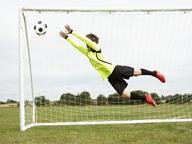
The English Abroad 4 - A Final Look Down Quiz
We've seen some English players that have plied their trade in Europe, but what about those that gained European success? Can you put these players into the order of when they played their first European final for their European club?
A matching quiz
by Red_John.
Estimated time: 3 mins.
- Home
- »
- Quizzes
- »
- Sports Trivia
- »
- UK
- »
- UK Football Players